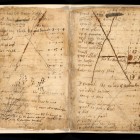
Jun 4, 2015
Today’s bookkeeping is a process most involved or interested in finance take for granted, because the thinking feels so basic to us. The truth is that the practice of trading and storing money or goods has evolved over the course of centuries, and will continue to evolve well past the technology of today.
Early merchants were akin to barters, trading either goods or services for something of equal value. People kept ledgers, which were necessary during legal disputes, but they looked very different from the balance sheets of today. In fact, those balance sheets are a fairly new concepts (just over 200 years old, which is a blink in the grand scheme of finance).
When someone needed to make a trade or an exchange, the transaction involved recording what was traded and what was received. So Farmer Jake might trade one chicken each month for six months in exchange for a new cabinet or a table for the kitchen. This transaction would be recorded, with each man named along with his promise, and the agreements were expected to be held to.
Various civilizations developed currency throughout the centuries, like the Romans, but bookkeeping stuck to this fairly rudimentary form because few empires lacked the kind of authority to develop a currency recognized the world over.
This method of bookkeeping also doesn’t account for all the time and effort that goes into producing goods, and so was not a true measure of value so much as a measure of what one could negotiate.
Samuel Phineas Uphamis an investor from NYC and SF. You may contact Phin on his Samual Phineas Upham website or Facebook page.
